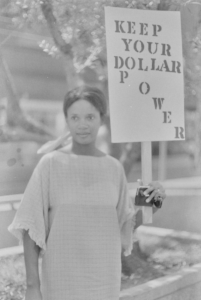For hundreds of years, Black people on the North American continent were enslaved–held captive and forced to work for no wages. The profits of these centuries of labor went to white landowners and white business owners who forced the Black people to wor

Woman at a rally carrying a sign that reads “Keep your dollar power.” (Photo by Ruth-Marion Baruch)
k farmland, build homes, construct cities, and serve them as housekeepers, cooks, porters, drivers, nannies, carpenters, and much more. In the wake of emancipation, the U.S. government promised Black people reparations–a form of long-overdue payment for services rendered to benefit the nation. But despite their promises, the government never paid these reparations.
The Panthers viewed this theft as not just past, but ongoing. In order to have ownership of anything in a capitalist society, you have to be able to save money and build wealth. The historical lack of wages placed Black people at a great economic disadvantage–most businesses, housing, and property were owned by white people, so white people made most of the profits. Segregation, discrimination in hiring, and disparities in wages continued to prevent Black people from having an equal shot at making future wages, too. The Panthers sought systemic solutions to these longstanding problems.


